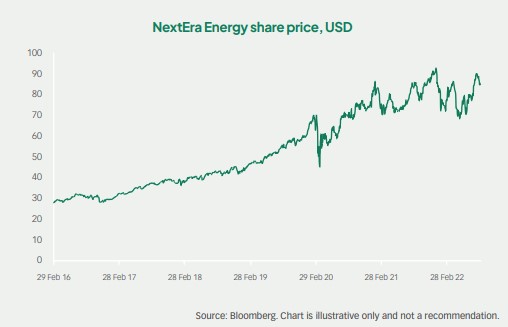Who are the ESG leaders of tomorrow?

Firetrail Investments
Sustainable investing is a phenomenon.
According to the Global Sustainable
Investment Alliance , US$35.3 trillion, or
more than a third of all assets in five of the
world’s biggest markets, are now managed
sustainably. Looking ahead, accounting giant
PwC forecasts between 40-60% of mutual
fund assets will be ESG focused by 2025. According to Barrenjoey, the Australia/NZ market has $US26bn in ESG in funds under management, with net inflows into ESG products of around $US10bn per annum.
Interest in sustainable investing has been fuelled in-part by media coverage of extreme weather events, geopolitical tensions, and post-covid societal changes.
Investors have also increasingly questioned the ESG credentials of the companies they are investing in. Assisted by external ESG ratings providers, equity markets have been quick to identify companies that are sustainable champions and have re-rated their share prices significantly.

For example, NextEra Energy is the world’s
largest producer of wind and solar energy. The
company is rated AA by MSCI. At the start of
2017, the company traded on a price/earnings
multiple of 19x. Today the company trades on
a multiple of 34x. NextEra has generated a
5-year annualised return of 22%, versus a sector
median of 11%.

Large companies have also benefited from the
ESG investing phenomenon. There is a focus on
companies that display corporate best-practice,
which often means building an in-house
sustainability department that has the capacity
to implement the right policies to achieve a high
ESG score. It is often the larger, higher quality
companies that have had the financial resources
to do this.
The ability of the mega-cap growth and quality companies to achieve a high ESG rating has led to many investors allocating capital to sustainable strategies that are highly correlated with a standard global equity approach, which also exhibits a similar factor bias and risk profile. This has led to underperformance of the average ESG global equity portfolio of around 630 basis points relative to the MSCI AC World Index.
At Firetrail, we believe that it is important
to look beyond the current champions
in positive change that often trade on
expensive valuations and are often owned by most global equity funds (think Amazon, Alphabet, and Meta). By backing overlooked
companies that are early in their positive
change progress, and facilitating their
journey through stewardship, it is possible
to generate meaningful alpha for clients. As
these companies improve their sustainability
credentials in the eyes of the market, their
share prices are likely to re-rate higher.
There are three investment signposts investors should look for to identify the ESG leaders of tomorrow.
1. Sustainable
companies deserve
premium valuations
– Companies that
the market perceives
to have sustainable
characteristics, such
as good environmental
practices, a social license
to continue operations
over the long-term,
or strong corporate
governance, deserve
premium valuations
relative to companies
that do not.
2. Share prices follow
earnings – No matter
how undervalued a
company may seem, if earnings expectations
are downgraded, the share price will
generally fall. Companies generally reach
fair value when they meet or beat market
earning expectations.
3. The market is slow to recognise positive
change – Companies can change for the
better or worse. Fundamental analysis is the
best way to uncover companies that can
benefit from positive change in their business,
industry, or markets.
A improving ESG proposition from a company also creates shareholder value as it facilitates top-line growth, reduces costs, minimises regulatory and legal interventions, improves employee productivity, and optimises investment and capital expenditures.
Looking beyond the traditional sustainable champions, towards the leaders of tomorrow, is an approach to global equity investing that is rarely used by investors today. Sustainable investing isn't an investment risk to be managed, it is an enormous investment opportunity.
4 topics

Expertise
